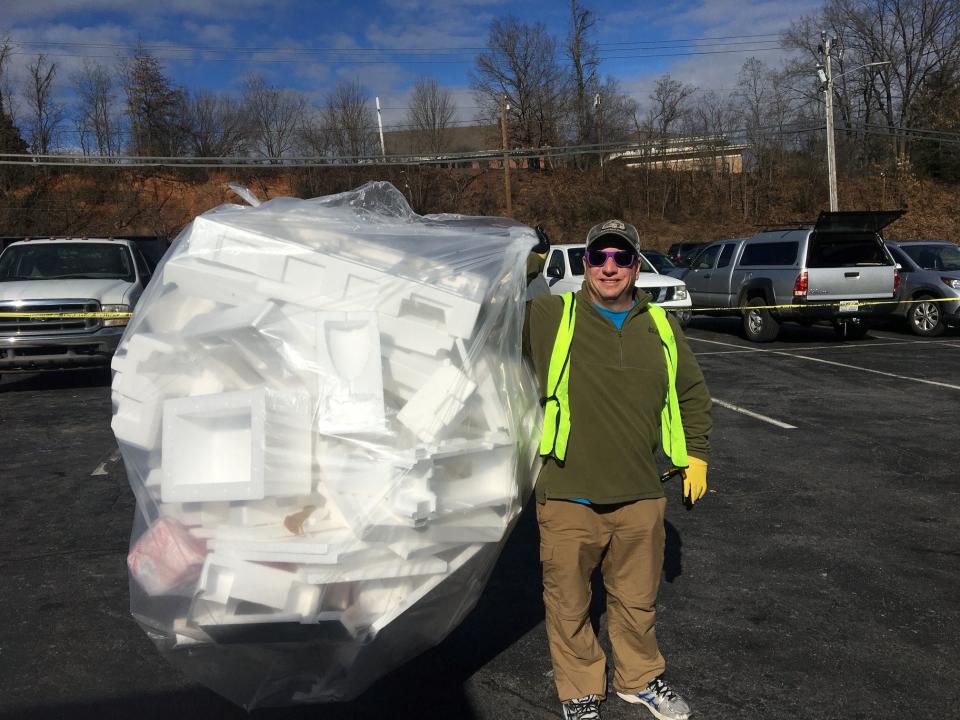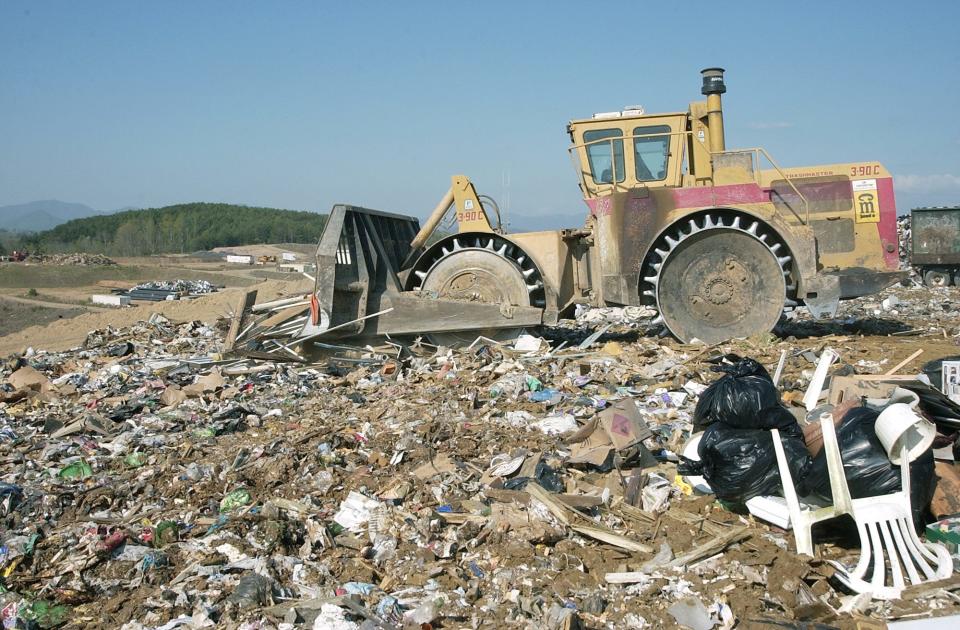Answer Woman: How much recycling ends up in the landfill?
ASHEVILLE - A reader wonders if efforts to reduce waste are a waste of time. Got a question for Answer Man or Answer Woman? Email Executive Editor Karen Chávez at KChavez@citizentimes.com and your question could appear in an upcoming column.
Question: We have dutifully recycled what we could, even before Asheville had curbside collection. The volume of our recycling far exceeds the volume of our garbage now. But how much of what we put in those blue bins actually gets recycled? It was less than a year ago that I learned plastic "clamshells" are not accepted (although not on the "keep these items out" list on the guide distributed by the City of Asheville). My husband refuses to believe coated milk and orange juice containers are recycled. And what about bags collected at local grocery stores? How much "recycling" ends up in the landfill eventually?
Answer: Your dedication to recycling and the environment is commendable and just what the recycling companies and the city’s sustainability and sanitation advocates encourage from residents.
According to Asheville’s Sanitation department, in the 2023 fiscal year, 7,623 tons of recyclables were collected through the city’s residential curbside recycling program. The contamination rate ― the percentage of collected items that were not recyclable ― was reported to have been less than 10%.
Curbside Management, also known as Curbie, is a private company based in Woodfin that collects and processes recycling for Asheville, as well as Fletcher, Weaverville and Woodfin.
“All of the recyclable material is dumped into a big mixed pile at our facility,” Curbie’s President Abraham Lawson said in an email on Feb. 5. “The material is loaded onto a belt which feeds our sorting system. Using a combination of mechanical machines, robots and people, we sort the materials into material types (Cardboard, Mixed Paper, PET Bottles (#1), PP (#5), HDPE (#2), Steel Cans, Aluminum Cans, Glass). Our processing system, separates materials by size, shape, color, and material composition.”
After processing, he said the material is used to make new products and materials like cardboard or box board used for cereal boxes.
Mixed paper may be used for insulation, tissue paper or hydroseed.
Other items to come from recycled materials include aluminum and steel cans, glass, carpet and flowerpots.
“Once the processed materials are separated into each material type, they are compressed into ~1500 lb bales, loaded onto a semi-trailer and sold/shipped to other companies to be turned into usable goods,” Lawson said. “We do our best to keep as much of the material as close to home as possible.”
Lawson said most plastics are distributed across North Carolina, and cardboard, mixed paper and metals are shipped to neighboring states.
What can and can’t be recycled?
Curbie’s list of accepted recyclable items includes bottles, tubs, jugs and jars which include plastic containers from milk, juice, soup, shampoo bottles, detergent, dishwashing liquid, mouthwash and soda. Glass bottles used for products like condiments, wine, beer and baby food are accepted, as are metal cans used to package pet food, tuna, fruits and vegetables. Items must be empty and rinsed.
Paper, cartons and flattened cardboard are welcome, too.
The problematic items not accepted for recycling include food and grease-stained materials, plastic bags/wrap, Styrofoam/peanuts and tanglers, like cords, hoses and wires.

Clear plastic clamshells, described as containers that have a flap lid like takeaway food containers, are not recyclable.
“They cannot be recycled due to the distinct chemical properties used in the manufacturing process,” Lawson said.
Pizza boxes are often mistaken for being recyclable but are not once they are used due to the grease, oil and cheese that stain the cardboard and make it unacceptable, according to Curbie.
Adhesive stickers, like labels and coupons, stuck on food containers put them out of the running for recycling, too. Curbie’s website states, “The easiest remedy for this problem is to cut or tear out the soiled portions of your pizza boxes and trash them. For example, you can tear the top of the box off, recycle that and throw away the bottom part containing the grease. If the entire box is grease-free, the whole box can be recycled with a guilt-free conscience.”

Are grocery store bags recycled?
Plastic bags are not accepted by Buncombe County’s recycling facility and residents are advised to, “Please return clean, dry, empty plastic bags to stores that provide designated plastic bag recycling drop-off bins—such as Ingles, Harris Teeter, Food Lion, and Lowes.”
Curbie directs people to Ingles and Wal-Mart’s plastic bag recycling bins located at the entrances of the stores.
“Plastic bags can be recycled. However, they should not be placed in your blue recycle bins,” Lawson said. “Plastic bags get tangled in the sort system and can cause serious mechanical damage and can contaminate other material streams.”
As a part of Ingles’ Green Initiatives, the company encourages customers to return plastic bags to its stores for recycling. In 2022, Ingles Markets Chief Financial Officer Pat Jackson told the Citizen Times that the bags are sent to its Black Mountain warehouse – the town the company is headquartered – to be consolidated and shipped to manufacturer Trex Company which processes the plastic bags to make composite boards and repurposes them for decking products.
Helpful resources
For guidance on recycling, visit AVL Collects Waste Wizard at ashevillenc.gov/AVLcollects or download the free AVLcollects app on your smartphone.
The city offers additional resources on guidance on recycling, composting and disposing of hazardous waste, as well as its food scraps drop-off program and food waste reduction initiative at ashevillenc.gov.
Stories you may have missed:
Buncombe County garbage pickup, recycling fees increase in new year: How much?
Ban on use of plastic bags to dispose of yard waste in Asheville set to begin
Bears, composting and Asheville's solution to 1,000 of pounds of weekly food waste
West Asheville gets free compost drop-off site, more to come in Buncombe County
Tiana Kennell is the food and dining reporter for the Asheville Citizen Times, part of the USA Today Network. Email her at tkennell@citizentimes.com or follow her on Instagram @PrincessOfPage. Please support this type of journalism with a subscription to the Citizen Times.
This article originally appeared on Asheville Citizen Times: Asheville tops 7,000 tons of recyclables in city's collection program

